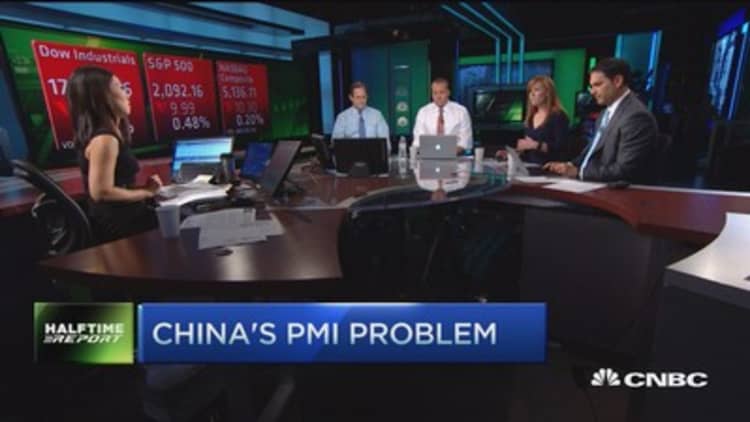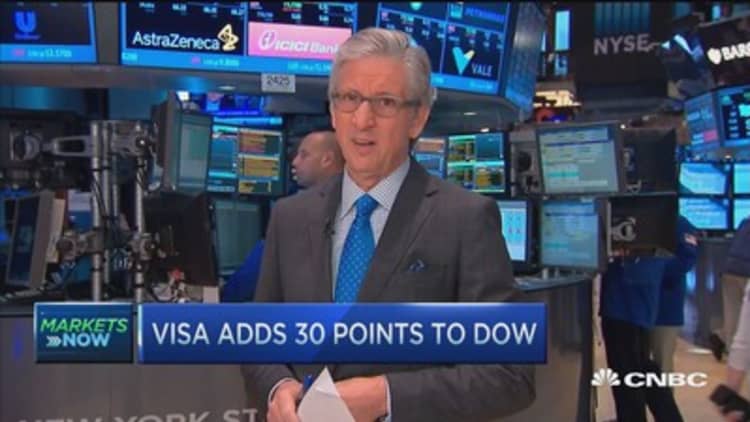


U.S. stocks closed about 1 percent lower on Friday, despite surprisingly strong Amazon earnings, as signs of slower global growth weighed on sentiment. (Tweet This)
The major averages closed down more than 2 percent for the week, with the S&P 500 and Nasdaq posting their worst since March. The Dow Jones industrial average had its worst week since January, off nearly 2.9 percent for the week.
"I think the market's very much concerned about the commodity (decline)," said John Lonski, chief economist at Moody's. "The contraction in China manufacturing activity is gaining momentum and the credit market has yet to signal that rates are not about to go higher."
He also noted a surprising decline in new home sales and continued lack of revenue growth in earnings. Nearly all the commodities are in a bear market and gold and crude settled at lows Friday.
"You've got some major growth concerns and that is what's weighing on investors minds," said Peter Boockvar, chief market strategist at The Lindsey Group. He noted that earnings and data have mostly indicated softer growth, outside of encouraging reports from Google, Netflix and Amazon.
The major averages extended losses after breaking through support levels of about 2,088 on the S&P 500 and 17,600 on the Dow, according to Art Cashin, director of floor operations at UBS.
The S&P 500 ended below its 50-day moving average.
The Dow closed about 160 points lower to below its 200-day moving average as Goldman Sachs declined and Chevron and Exxon Mobil hit multi-year lows with the continued decline in oil. DuPont closed 2.6 percent lower as materials had their worst week since December.
Read MoreThe Dow just broke a pretty dubious record
The blue-chip index is down about 1.4 percent for the year.
"You're seeing a reallocation in assets, moving away form some of the losers," said JJ Kinahan, chief strategist at TD Ameritrade. "I think people are taking off risk for the weekend."
The Nasdaq Composite closed 1.12 percent lower. A disappointing Biogen earnings report pressured the iShares Nasdaq biotechnology ETF (IBB) down 4 percent to weigh on the index, while Apple edged lower to close nearly 4 percent lower for the week, while Google dropped nearly 3 percent for a 6.4 percent weekly decline.
"I think the overarching driver for change may be the macro, not the micro," said Art Hogan, chief market strategist at Wunderlich Securities.
"It's been a week characterized by lackluster earnings with a few bright spots here and there," he said. "Away from that you've got this overarching concern that the global economy is slowing down."
In China, the Caixin Markit flash general manufacturing PMI for July came in at 48.2, a 15-month low. The July euro zone flash PMI was 52.2, a two-month low.
Read MoreDo your investments operate in China? Check this out
The weak data and continued commodity selloff sent Asian and European stocks lower.
Copper and the Thomson Reuters CoreCommodity CRB index fell to 6-year lows.
Gold hit a fresh five-year low before reversing in the late afternoon to trade higher near $1,097 an ounce. Gold futures ended down $8.60 at $1,085.50 an ounce, posting five consecutive weeks of losses for the first time since October.
The gold miners index (GDX) briefly fell more than 2.5 percent to an all-time low, posting its worst week since the beginning of March.
Crude gave back initial gains to trade about half a percent lower. Crude oil futures for September delivery settled at the lowest level since March 31, down 31 cents, or 0.64 percent, at $48.14 a barrel on the New York Mercantile Exchange.
"Obviously a little nervousness coming out of Asia last night. This last week the focus is all earnings," said Peter Coleman, head trader at Convergex. "In the tech sector it's been mixed. Earnings in general have been a bit better than expected. You had some big Dow names (miss)."
Adding to the decline in the major averages, Southwest Airlines plunged 4 percent on the day to lead declines in the Dow transports, which ended 0.67 percent lower. The index failed to recover from correction territory, down about 2.7 percent for the week.
Read More Five US airlines face price-gouging allegations
"You've got a situation here where the market is forecasting weaker economic growth, not stronger," said Adam Sarhan, CEO of Sarhan Capital. "That directly contradicts the Fed's narrative."
The Federal Open Market Committee holds its July meeting next week but no press conference is scheduled.
The U.S. flash manufacturing PMI for July edged up to 53.8, from a 20-month low hit in June.
showed a decline of 6.8 percent to a seven-month low in June. On Wednesday, hit a near 8-1/2-year high.
"The new home sales number are often a very volatile figure and we've seen a strong uptrend over the last couple of months," said Brad Friedlander, co-founder of Angel Oak Capital Advisors, which as $5 billion in assets under management. He pointed out that the figure is still up about 20 percent from the same month last year.
However, the PHLX Housing Sector Index fell 0.93 percent.
The dollar trimmed gains, with the euro at $1.098 and the yen at 123.7 yen against the greenback.
Treasury yields held lower, with the 10-year yield at 2.26 percent and the 2-year at 0.67 percent. The yield curve steepened slightly after the Fed issued a statement Friday on the inadvertent release on June 29 of staff economic forecasts that were more dovish than some expected.
Among the firms posting results before the open, Biogen Idec beat on earnings but missed on revenue, as well as lowered full-year guidance.
American Airlines fell about 7 percent despite posting earnings that topped expectations on revenue a touch below forecasts. The airline also announced the authorization of an addition $2 billion in share buybacks.
VF Corp. closed mildly lower, down 0.2 percent. The maker of North Face, Wrangler, and other apparel brands, posted earnings that beat on both the top and bottom lines. The firm also raised its full-year outlook.
Read MoreEarly movers: CI, AMZN, SAVE, BIIB, MCO, T & more
Shares of Regeneron closed down about 2.6 percent on news the the firm's new cholesterol drug but limited its use. The stock was halted for much of the day and reopened more than 3 percent lower in late afternoon trade.
In corporate deals, Anthem said on Friday it would buy Cigna in a deal valued at $54.2 billion, by membership. Both stocks fell on Friday, with Anthem off 2.8 percent and Cigna down 5.6 percent.
Amazon closed 9.8 percent higher after soaring more than 17 percent in the open to a record after reporting unexpected quarterly profit after the close Thursday. The e-commerce firm's market cap now surpasses that of Wal-Mart.
Starbucks and Visa also traded at all-time highs after beating on both the top and bottom line. The coffee giant posted a 1.29 percent gain for the day, while Visa jumped 4.25 percent.
However, Capital One Financial plunged 13 percent after its quarterly earnings missed expectations, with profit of $1.78 a share on $5.67 billion in revenue, flat year-over-year.
Mostly lackluster earnings on Thursday pushed U.S. stocks lower. The only positive trading session this week was Monday, when the major averages closed just a touch higher.
"One of the things I'm looking for in (the) early part of next week is for the market to recover from the downtrend," said Michael Wall, president of Wall Financial Group. If stocks bounce, he said they could break out of the recent sideways trend.
The Dow Jones Industrial Average closed down 163.39 points, or 0.92 percent, at 17,568.63, with DuPont leading 28 blue chips lower and Visa, Cisco and Walt Disney the only advancers. Visa was the best performer for the week, up 5.5 percent, while United Technologies was the worst, down 10.3 percent.
The closed down 22.50 points, or 1.07 percent, at 2,079.65, with health care leading nine sectors lower and utilities the only advancer, by only 0.03 percent. All the sectors ended lower for the week, with materials plunging nearly 5.5 percent as the worst performer for the 5-day period.
The Nasdaq closed down 57.78 points, or 1.12 percent, at 5,088.63.
The CBOE Volatility Index (VIX), widely considered the best gauge of fear in the market, traded near 14 after briefly climbed above 14.5 for a 15 percent spike.
About three stocks declined for every advancer on the New York Stock Exchange, with an exchange volume of 892 million and a composite volume of about 3.8 billion in the close.
High-frequency trading accounted for 49 percent of July-to-date's daily trading volume of about 6.6 billion shares, according to TABB Group. During the peak levels of high-frequency trading in 2009, about 61 percent of 9.8 billion of average daily shares traded were executed by high-frequency traders.
—CNBC's Peter Schacknow contributed to this report.


